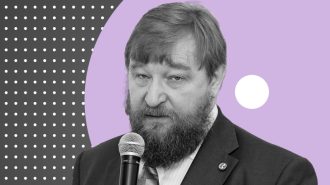The FSB completed investigative actions in the case of corresponding member of the Russian Academy of Sciences Sergei Abramov a year later: the materials were transferred to the court, which must set a date for the hearing. According to T-invariant, Abramov’s case involves seven donations of 1,000 rubles each. The scientist himself has repeatedly denied his guilt, including denying that he made these translations.
Computer science
In 2023, the FSB began subjecting dissenters to punitive psychiatry. Corresponding Member of the Russian Academy of Sciences Sergei Abramov left the psychiatric hospital after the examination and became familiar with the updated version of the charges. T-invariant spoke with the scientist about his life with the “extremist” label, his political views and the reasons for the security forces’ attack on the Russian supercomputer industry.
The Russian Federation's leading specialist in supercomputer systems was first checked by the FSB “for treason”, then kept under house arrest for six months on suspicion of “financing an extremist organization”. After fruitless attempts to plant according to the proven Soviet tradition, the “fool” is used. Sergei Abramov, corresponding member of the Russian Academy of Sciences, founder of a number of innovative companies, is planned to be sent to a psychiatric hospital for three weeks on November 30 for “conducting an inpatient examination.”Because the outpatient motivation of the scientist who organizes the supercomputer forum in Pereslavl-Zalessky, even while under investigation, the FSB could not understand even after eight months.
Artificial Intelligence development leaders compare AI to a pandemic and nuclear war. Are they genuinely wrong, or do they benefit?
Sergey Abramov, corresponding member of the Russian Academy of Sciences, has been under house arrest for two months now. He is accused of "financing an extremist organization." Details of the criminal case remain unpublished, but T-Invariant found out that Abramov had previously been investigated under the article of law on "state treason," and the scientist had a security clearance for state secrets.
Despite its reputation as a scientific and technological superpower, the Soviet Union missed every phase of the 20th century’s information technology revolution. The first episode was a ten-year delay in the conceptual cybernetic revolution. It did not prevent the creation of the first Soviet computers, but led to a lag in subsequent stages.







